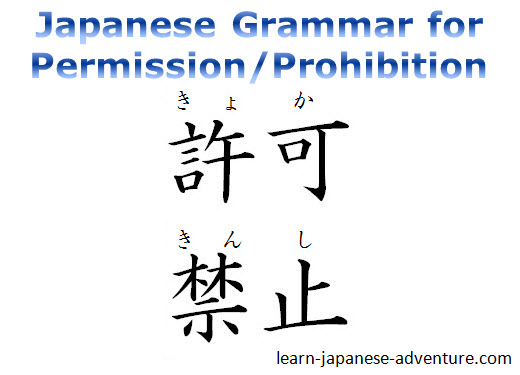- Home
- Intermediate Lessons
- Japanese Grammar Permission Prohibition
Japanese Grammar for Permission/Prohibition -
Intermediate Lessons: 15
The Japanese grammar you will learn in this lesson is about permission and prohibition.

You will learn how to ask for permission, how to grant permission, and also how to express prohibition to do something.
Sentence Patterns
Let's take a look at the sentence patterns...
| Verb (て-form) もいいです | Permission 許可 (kyoka) |
| Verb (te-form) mo ii desu | You may do ~ |
| Verb (て-form) はいけません | Prohibition 禁止 (kinshi) |
| Verb (te-form) wa ikemasen | You must not do ~ |
As you can see, the two grammars are formed by using て-form (te-form).
Let's take a look at some examples...
|
1. |
このレストランでたばこを吸ってはいけません。 |
|
2. |
ここに車を止めてはいけません。 |
|
3. |
教室でサッカーをしてはいけません。 |
|
4. |
ここで写真を撮ってはいけません。 |
|
5. |
この部屋に入ってはいけません。 |
Questions and Answers in Japanese Grammar for Permission
How do you ask for permission to do something? How do you answer when someone asked you for permission to do something?
Again, let's check out the sentence patterns first...
| Question: | Verb (て-form) もいいですか |
| May I do something? | |
| Answer Yes: | はい、Verb (て-form) もいいです |
| Yes you may... | |
| Answer No: | いいえ、Verb (て-form) はいけません |
| No you must not... |
It's simple to ask for permission to do something. You just need to add the question word か (ka) to the "Verb (て-form) もいいです" sentence.
Since this is a Yes/No question, the answer should begin with はい (hai) or いいえ (iie).
Let's take a look at the smoking example...
| Question: | ここでたばこを吸ってもいいですか。 |
| koko de tabako wo suttemo ii desu ka | |
| Meaning: May I smoke here? | |
| Answer Yes: | はい、(ここでたばこを)吸ってもいいです。 |
| hai, (koko de tabako wo) suttemo ii desu | |
| Meaning: Yes, you may smoke (here). | |
| Answer No: | いいえ、(ここではたばこを)吸ってはいけません。 |
| iie, (koko dewa tabako wo) suttewa ikemasen | |
| Meaning: No, you must not smoke (here). |
Note: Those inside the brackets can be omitted in the answers.
When Answering to Superiors/Customers
In the previous example, the tone is quite strong when granting or denying permission - "You may do something", "You must not do something".
It's normally used by parents to children or teachers to students. If you are answering to your superiors, boss or customers, it sounds too strong and rude.
Therefore when answering to your superiors, boss or customers, you will normally use the Japanese grammar in request form like "はい、どうぞ Verb (て-form) ください" or "いいえ、Verb (ない-form)でください" to be more polite.
For example...
| Answer Yes: | はい、どうぞ 吸ってください。 |
| hai, douzo sutte kudasai | |
| Meaning: Yes, please smoke. | |
| Answer No: | いいえ、吸わないでください。 |
| iie, suwanaide kudasai | |
| Meaning: No, please don't smoke. |
Negative Answers in a Conversation
However, in a conversation, native Japanese don't like to say いいえ (iie) directly when they are denying something. They will likely say the following...
| Answer No: | すみません。 |
| sumimasen | |
| Meaning: I am sorry. (Implied that you may not do so) | |
| Answer No: | ここではちょっと...。 |
| koko dewa chotto... | |
| Meaning: It's not convenient...here |
Asking Negative Questions with Japanese Grammar for Prohibition
You can also ask negative questions with the Japanese grammar "Verb (て-form) はいけません". In this case, you are asking for a permission to do something that you think it's likely to be prohibited.
"Verb (て-form) はいけません" means "You must not do something". Turning it into a question will become "Verb (て-form) はいけませんか" which means "Mustn't I do something?"
| Question: | Verb (て-form) はいけませんか |
| Mustn't I do something? | |
| Answer No: | はい、Verb (て-form) はいけません |
| No, you mustn't... | |
| Answer Yes: | いいえ、Verb (て-form) もいいです |
| Yes, you may... |
はい (hai) in Japanese actually means "I agree with what you said" and not simply a direct translation of "Yes" in English.
Similarly, いいえ (iie) means "I disagree with what you said" and not directly translated to "No" in English.
Therefore there are differences in the Japanese answers and the English translations when you answer "Yes" or "No" to a negative question.
Let's use the same smoking example to show how to ask and answer a negative question...
| Question: | ここでたばこを吸ってはいけませんか。 |
| koko de tabako wo suttewa ikemasen ka | |
| Meaning: Mustn't I smoke here? | |
| Answer No: | はい、(ここではたばこを)吸ってはいけません。 |
| hai, (koko dewa tabako wo) suttewa ikemasen | |
| Meaning: No, you must not smoke (here). | |
| Answer Yes: | いいえ、(ここでたばこを)吸ってもいいです。 |
| iie, (koko de tabako wo) suttemo ii desu | |
| Meaning: Yes, you may smoke (here). |
Note: Those inside the brackets can be omitted in the answers.
In the above example, the situation might be that you are about to smoke in a restaurant. As soon as you take out a cigarette, everyone is staring at you.
That makes you think that perhaps it's prohibited to smoke in the restaurant. In this case, you can ask the negative question as above to confirm your thoughts.
In Japanese grammar, the question form for permission "Verb (て-form) もいいですか" is very important because it's a kind of respect that you show for others, especially in the Japanese society where the people emphasize a lot on courtesy and politeness.
Mystery Sales! Get 45% Forever OFF Premium & Premium PLUS! Ends on 20 Feb 2026
The link above is an affiliate link, which means that I would earn a commission (at no extra cost to you) if you do end up purchasing the related learning course.
Previous - Lesson 14: Japanese Particle ga
Buy me a coffee







